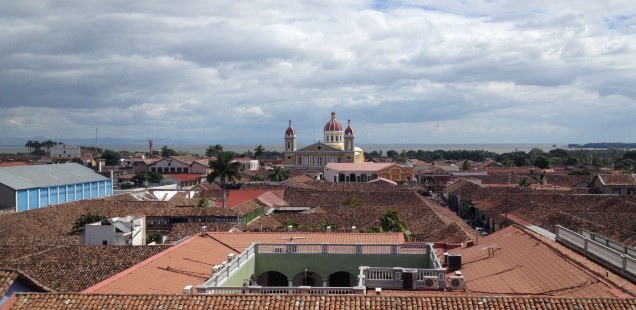
Traveling to Nicaragua from Costa Rica
We viewed the requirement for non-residents to leave Costa Rica every 90 days more as a blessing than as a curse. As folks who are always up for an adventure, we wanted to visit neighboring countries anyway. Having already driven to Panama, the country which borders Costa Rica to the south, we decided to take a bus to Costa Rica’s northern neighbor this time around.
We’ve met numerous Americans here who repeatedly mention the poverty in Costa Rica. Without a doubt, Costa Rica’s per person GDP is much lower than that of the U.S. At the same time, given that Costa Rica is wealthier than 7 other countries to which I’ve traveled, I don’t necessarily view it as a poverty-stricken place. Neither do Nicaraguans. In fact, because Costa Rica is stable and provides economic opportunities, many Nicaraguans migrate south to Costa Rica as opposed to migrating North to the U.S. Immigration and population estimates are difficult to accurately obtain for any country, but it is believed that roughly 400,000 Nicaraguans live in Costa Rica. They largely engage in jobs like seasonal agricultural activities, construction, private security, and domestic help. There is tension over this immigration, as some Nicaraguans are here legally and some are not. Sound familiar?
We purchased our bus tickets to Granada, Nicaragua through a local travel agent. At the time, we understood that we couldn’t go directly from Jaco to Granada with the tickets we bought, but rather we’d have to leave from Puntarenas, a town north of us on Costa Rica’s Pacific coast. Also, we were happy to find out that if we had to change the date of our trip for any reason, we could do so without penalty. Given our schedules, we did indeed have to take advantage of this and push back the date of the trip. We hoped that those changes wouldn’t cause confusion. They did.
Our original tickets had us leaving from San Jose. The new tickets should have had us leaving from Puntarenas. On the morning of our trip, we got up bright and early and took a cab to the bus stop in Puntarenas. The bus stop was a bit of a confusing place in that there must have been 8 other bus companies that weren’t our bus line picking people up at that stop. As time went on and our pick-up time passed, we thought we might have somehow missed the bus. When it finally arrived, we were extremely relieved to finally be getting on board.
Then, the bus driver told us only two of us could board. Now, if he had told us only one person could get on, I think Heather might have been like, “Peace out, suckas. I need some alone time.” But two? Who gets left behind? After calls on the spot to the travel agent and to her assistant, we determined that when the agent changed the tickets, she mistakenly only changed two of them so that they were leaving from Puntarenas. Since the bus began its journey in San Jose and we weren’t there, those two seats were sold. Thus, there simply wasn’t space. This situation would suck if you were a young backpacker traveling through Central America staying in hostels. But it really sucks if you’re a family of four traveling with a four year old. After an inordinate amount of dialogue (all in Spanish, mind you) which caused the bus to be held up by about 30 minutes, they finally let us on. But unfortunately, the two extra seats that they found for us were not all together. To keep Atticus from having to sit way off by himself somewhere, he had to sit in Heather’s lap until a spare seat opened up (which didn’t happen until almost the end of the trip). Given that this is a child who doesn’t even stop moving while he is sleeping, it was a difficult journey to say the least.
As I mentioned when I wrote about traveling to Panama, land crossings can be insane. Like Panama, Nicaragua didn’t disappoint. I must say, however, that going through the process with a bus full of people who were doing the same thing as us made it easier. Not only that, but the employees of Ticabus are so accustomed to the procedures, they have a systematic and efficient approach.
Upon arrival at the border, we got off the bus to get in line to pay the Costa Rican departure tax and also to go through Costa Rican immigration. Then, we got back on the bus and rode for about 1 km to the Nicaraguan immigration and customs area. During that brief trip, a Ticabus employee walked through the bus collecting money and taking passports which he then deposited into a non-descript plastic bag. At the time, I thought there was a chance we’d never see those passports again. This process was made even more confusing by not speaking the language very well. They announced the procedure in advance. We just didn’t catch every word.
It turns out, that employee takes those passports and gets all of them stamped at the Nicaraguan immigration counter. Meanwhile, we had to pull all of our luggage off the bus and put it on a table for a Nicaraguan customs agent to inspect. If you aren’t a fan of chaos, this scene would likely make your head explode. Heather and I were simultaneously keeping an eye on a 13 year old and a 4 year old, monitoring our luggage (that was just sitting outside on a picnic table waiting to be inspected), fending off fairly aggressive vendors wanting to exchange money or sell various wares, while worrying about our passports that were somewhere in a plastic bag.
When I say “Heather and I” were doing all of that, I really mean “me”. Heather and Maddie were both starving by now. So their main focus was eating. Heather has convinced herself that she has some sort of low blood sugar medical condition in order to justify her extreme grouchiness when she is hungry. In any event, a nice lady was selling casados (a local dish consisting of a meat, rice and beans, and some sort of salad) out of a Tupperware container. Nothing will test the strength of your stomach like eating room temperature chicken from a plastic bin on a 90 degree day at the Nicaraguan border. Fortunately, the antibodies we’ve built up from all of the other questionable food and water we’ve consumed thus far protected Heather and Maddie from a serious bout of food poisoning.
We finally made it to Granada. Instead of getting dropped off at what we thought would be a bus station, we were left at what was simply a bus stop on the street, with a taxi waiting nearby. We didn’t have much luggage, so we probably could have walked to our hotel. But, given the fact that we didn’t know the city at all and the journey already had pretty much been a nightmare, we opted to take a cab.
I’m sure I’ve been ripped-off by a cab driver at some point in my life and not known it. But, to my knowledge, this is the first time in all of my travels where I knew that a cab driver straight-up got me. We overpaid by way too much. Now, a normal person would just let that go. But, as Heather will attest, I’m not normal. My continued search for that cab driver so that I could confront him about his duplicity would be a running theme during the whole trip. In fact, this was an actual conversation I had with my wife. Heather: “So what are you going to do if you see him parked somewhere?” Me: “Yank him out of the car through the driver’s side window.” Heather: “What if you see him driving?” Me: “I’m probably going to jump on the hood of his car.” Heather, “OK. We didn’t come to Nicaragua for me to be visiting you in the hospital or trying to bail you out of a Central American jail.” Of course, she was 100% right. I just needed to chill. Nonetheless, if you happen to be in Granada and you take a grey cab with a driver named Jose, wait until you get to your destination, and then feel free to punch him in the throat while saying, “That’s from Jamie Wallace. Keep the change.” (or whatever other action movie line works for you).
After our short cab ride, we got settled into our hotel which was called “Mansion de Chocolate”. I’m pretty sure Heather picked it mainly because it had the word “chocolate” in the title. It’s a smart move by the hotel owner. If Leavenworth Federal Penitentiary was named “Chocolate Federal Penitentiary” instead, I bet less people would dread spending time there. I guess there is, in fact, something to a name. In any event, we mainly use a hotel room as a place to put our stuff while we tour as much as possible, so we typically don’t stress too much about the hotel itself. We had a nice stay there.
What did stand out about it to me, however, were the aggressive ducks in the hotel pool. Maddie was antagonizing them and got her comeuppance when she wasn’t looking. While she was in the pool talking to us, one of the ducks stealthily snuck up on her, got on her shoulder, and retaliated by biting her ear. Naturally, getting bit in the ear caused her to jerk her head quickly. Not realizing she was by the side of the pool, Maddie slammed her face into the pool wall. I envisioned her coming back to Costa Rica with a broken nose and black eyes muttering to herself, “Don’t mess with the ducks in Nicaragua.” Fortunately, she healed quickly.
Founded in 1524 by Francisco Córdoba (whose name I’ve apparently been mispronouncing my whole life, and the reason their currency is called the “córdoba”), Granada is the oldest European city in mainland America. It sits right on Lake Nicaragua, which is the largest lake in Central America and the 20th largest in the world. Our objectives for this short trip were pretty simple. We wanted to get a feel for the culture, take in the architecture of a beautiful city, and spend some time on Lake Nicaragua.
Although there are some similarities to Costa Rica, like the presence of volcanoes for example, Nicaragua is quite different from its Southern neighbor. Granada is a prime example of those differences. Despite the fact that most Costa Ricans claim European descent, while most Nicaraguans would be classified as “mestizo”, I don’t think Costa Rica has a single city that feels as European as Granada does in terms of architecture.
In addition to exploring Granada on foot, we took a carriage ride as well. The knowledgeable driver intentionally spoke in Spanish that was slow enough for us to understand. I mean slow like a 45 being played at 33 1/3. By the way, if you understand that reference, you’re either a DJ or you’re old like me. In any event, this tour allowed us the chance to get our bearings in terms of the layout of the city and also provided opportunities for us to see the sights. As you might expect, there are absolutely beautiful churches throughout Granada. Among others, we visited La Merced, a common one for tourists to visit. It offers stunning views.
We like Jaco. But one of the aspects we feel it lacks is a true town square. Granada has this layout, and that makes it feel more like a real city (albeit a small one). The upside to the town square is that there are various activities that take place (like fire-juggling, breakdancing, and singing), but the downside is that it’s a pretty bustling locale where you feel the pressure of really needing to pay attention to your surroundings. It’s not that it’s dangerous. Nicaragua is statistically one of the safest places in Latin America. It’s just that, in a one hour span of having dinner outdoors, for example, we had interactions with well over 20 vendors. Stopping your conversation every 3 minutes to politely tell someone “No, gracias” is more disruptive than you might think. We can barely ever have a conversation due to the unceasing interjections of Atticus. Throwing 20 other people into the mix made for a challenging meal.
The next day we were planning to take a boat ride on Lake Nicaragua. Since Nicaragua is cheaper for certain items than Costa Rica, I set out to buy a few items that morning before we left for the lake. Not only did I go to the local market (which is an authentic market) to seek out a few goods, I also went to a Pali grocery store. While there, I noticed a man who I presumed to be the only other American in the store and asked him in English if he knew where the insect repellant was. He looked straight in my face and ignored me. I honestly thought he might have had a hearing disorder. Later, I got in line to check out and this man happened to be in the line next to me. I started talking to him again, and he ignored me again. At that point, I was annoyed because I could tell he was in fact hearing everything I was saying. Therefore, I decided to definitely keep talking to him until I found out what his problem was.
As we left the store at the same time, he started yelling into his smart watch, “Stop following me! This is how they do it! This is how they kidnap you!” He then continued ranting into his watch as we walked from the store about how cartels hire people to lure unsuspecting Americans and then kidnap them for ransom. He videotaped me and said he was going to put it on the internet. I told him that that was awesome, gave him my card, and asked if he could kindly link his video to my blog. He wasn’t amused and tore up my card, apparently because he thought it was all part of my master plan (after all, that card might have had a tracking chip in it). I checked my watch (which doesn’t contain a video or audio recorder, but does have a button that magically changes it into stopwatch mode) and realized I needed to get back to Heather and the kids immediately to catch our ride to the dock. Otherwise, I seriously would have spent the whole day just following this guy around acting like I had an earpiece and making pretend calls to my fake cohorts about his coordinates. The upshot is this. When you travel, it’s good to be aware. But it’s bad to be a paranoid nutjob. Find the balance.
Lake Nicaragua was really pretty, especially with Mombacho Volcano in the background. One interesting tidbit about it is that, although it is a freshwater lake, it contains bull sharks. While Lake Nicaragua doesn’t connect directly to the ocean, the 120 mile San Juan River does. The theory is that these bull sharks are able to inhabit the lake by traveling that river from the ocean.
Our trip on the lake was fairly short. If we had taken a longer one, we could have gotten to the various islands inhabited by monkeys. From what I’ve read, this is a fun experience. For us, however, we’ve seen our share of monkeys in Costa Rica. So boating out even further simply to see wildlife we sometimes see simply hiking up a mountain here wasn’t worth it to us.
After spending time on the lake, I wanted to show the family the market I had stumbled upon earlier that day. When I say it was “authentic”, I mean it is what markets were before there were stores. It reminded me of markets I’ve seen in African countries and definitely didn’t seem like anything that exists in Costa Rica. As we walked around this bustling place, I had an epiphany as I observed Heather and Maddie. The brains of some people go into overdrive in a situation like this and they pay attention to everything at once. Because they’re processing all of it, the scene becomes overwhelming. In the brains of other people, the frenetic activity all around them forces them to focus even more so that they don’t feel overwhelmed, but rather stimulated. I’m not going to say which camp Heather is in, but I will reveal that at some point she looked around frantically and yelled, “Oh my God. Where is Atticus?” Then she realized she was holding him in her arms.
Upon checking out of the hotel after our brief Nicaraguan excursion, we walked to the Ticabus station. Our trip back to Costa Rica was equally as eventful. Essentially, we had the same problem on the way back as we did on the way there. At least we knew it in advance this time around. Atticus sat on Heather’s lap the whole time. She complained about numb legs and lower back pain for days.
We sincerely enjoyed Nicaragua. At the same time, we were really happy to get back to Costa Rica. After all of us contemplating why that was, we independently came to the same conclusion. As I’ve mentioned before, it’s foolish to paint with a broad brush, so I will forever hesitate to do that. Here’s our observation, however, from our brief experience.
Although Nicaragua is not dangerous and its citizens are wonderful, it generally offers a hard life for the masses (hence the reason for the emigration to Costa Rica). As a result, the people we met there seemed to be less happy than the people we know in Costa Rica (including the Nicaraguans here). Don’t get me wrong. I don’t mean this as a criticism. It’s not an indictment to say folks might not be jumping for joy if they are struggling daily to make ends meet. That’s understandable. It’s hard to stop to smell the roses if you have to eat them to survive. Rather, it speaks volumes about the uniqueness of Costa Rican culture to generally seek happiness regardless of what is occurring. It’s one of the elements of the country that is difficult to quantify, but what makes it distinctive. Being broke is not fun. But if simply having money is what leads to happiness, then the world’s richest countries would also be the world’s happiest countries and they are not.
We considered a lot of places for this one year sabbatical. We’re over 8 months into it and still delighted with the decision we made to be right here right now. Pura Vida.
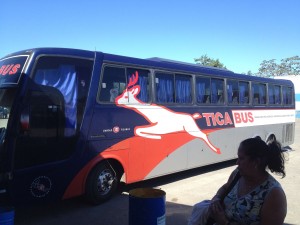
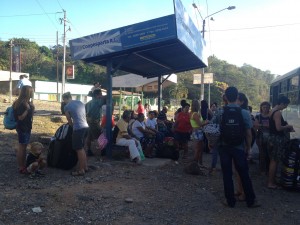
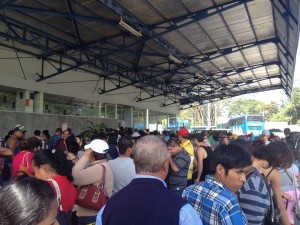
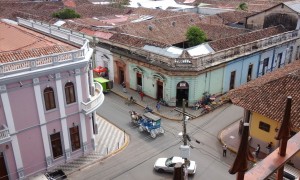
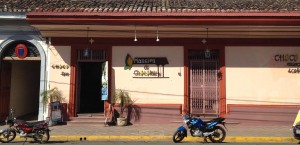
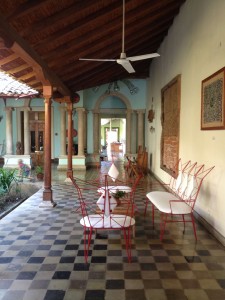
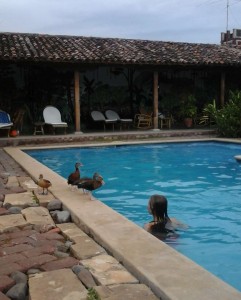
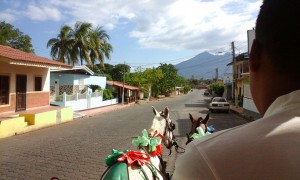
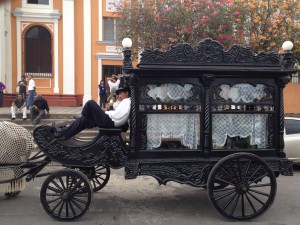
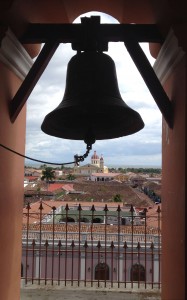
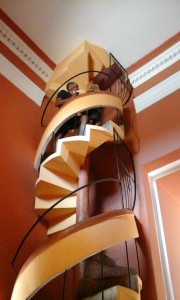
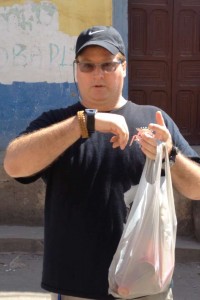
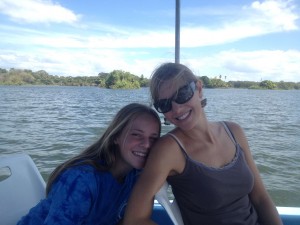
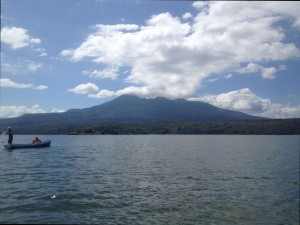
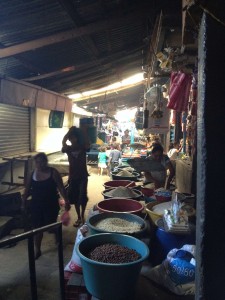
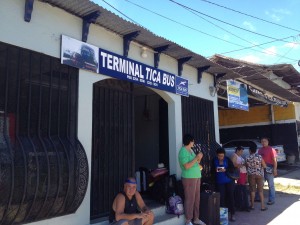
You would have needed 12 guys to carry and kidnap that one dude! I feel bad for Heather because I know the whole time you were there you were looking for the taxi driver and talking about various ways your attack would go down!
That’s the thing. He thought I did have 12 guys involved in the scheme!
Oh Wendi, you have no idea. Jamie failed to mention that the conversation occurred at 3 a.m. with all of us sleeping in one room. And then Atticus was awake 2 hours later at the first sign of daylight. Seriously, those 2 guys (Jamie and little Jamie) are going to put me in an early grave.
I loved the duck story. I always thoroughly enjoy reading about your adventures. Granada is a beautiful city.
The architecture is indeed quite pretty. It’s reminiscent of old, small towns in Spain.
I love the tormenting of the guy with the smartwatch! That is classic, reminds me of the relentless torment you have Carol when you caught her cheating at euchre! I know you have a mental picture of that cab driver in your head and with enough karma you know it will eventually bite him in the ass. When is your next excursion!!! I can’t wait for the next post, this is better than cable!! Heather my heart goes out to you but this is too damn funny. I was crying laughing reading about the smartwatch guy and Avery gave me a tissue. Trust me I can’t wait to read this again. Miss you guys!
I’m glad you had the chance to read this entry, and I’m even happier it made you laugh. I’m not sure when our next outing will be, but I’m sure it won’t be without its difficulties. Stay tuned.
How much did it coastfor all those repairs on your car after u bought it, transmission etc
Paul, you’re forcing me to relive a memory I’m trying to suppress. The short answer is, “a lot.” Honestly, labor was reasonable, and we intentionally bought a car for which we knew parts would be readily available in Costa Rica. But heat and salty air can wreak havoc on cars. Add in the fact that many of them are old to begin with, and you’ve got a perfect scenario for pouring money into a black hole. Here’s the calculation: $ we paid for the car at the outset + $ we spent on repairs/updates – amount we sold the car for at the end of our experience = 1 huge headache where we didn’t come out ahead. I actually saved every receipt. So if you’re curious about exactly what we paid for certain items, I’d be happy to email them to you.